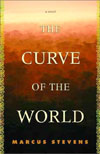Debut Novel Combines Strong Writing With Page-Turning Suspense
 On the surface, Marcus Stevens’s new novel, The Curve of the World (Algonquin), is an adventure novel. A New York businessman is stranded in the Congolese rainforest, desperately running from a rogue militia, all the while trying to survive a cruel and unknown environment. But dig deeper, and Stevens’s first novel is about the human mind, and how our own perceptions can create or remake the world in which we live.
On the surface, Marcus Stevens’s new novel, The Curve of the World (Algonquin), is an adventure novel. A New York businessman is stranded in the Congolese rainforest, desperately running from a rogue militia, all the while trying to survive a cruel and unknown environment. But dig deeper, and Stevens’s first novel is about the human mind, and how our own perceptions can create or remake the world in which we live.
"We create barriers [both physically and mentally], a lot of times to feel secure and safe," said Marcus Stevens, who spoke via phone to Bookselling This Week from his ranch in Bozeman, Montana. "But they can also become prisons, because we feel we cannot change these assumptions. In the novel, I wanted there to be a parallel between physically being unable to escape and not knowing where you are, with the more mental process about where you are with your life and how you can change those assumptions."
The novel was a top 10 selection of the May/June Book Sense 76, and in nominating the title Jeanne Michael of Odyssey Books in Grass Valley, California, said, "This is a novel I can recommend to a lot of readers."
Stevens’s novel details the story of Lewis Burke, a businessman who works for the Coca-Cola company. He is on his way to South Africa when his plane is forced to make an emergency landing in a remote and politically turbulent area of the Congo. When rebels seize the plane, Lewis escapes into the rainforest. While Lewis tries to find his way out of the thick canopy, his wife, Helen, and blind son, Shane, travel to Africa in the hopes of finding him.
While lost in the rainforest Lewis finds that the very challenge of surviving each day radically changes how he views his world. Whether it is his distant relationship with Shane, or his failing marriage, the struggle forces Lewis to confront his past and his fears, and all that he once assumed to be "true."
Certainly, perception is a prominent theme in The Curve of the World. There is Lewis’s reality versus the Congolese natives’ idea of magic. As he desperately tries to find his way out of the rainforest, overwhelmed by the challenge to survive, Lewis constantly reviews his past. Then, during bouts of malaria, Lewis finds himself in a dreamlike state, where the physical world becomes blurred with mystic visions and nightmares.
Ironically, in the rainforest, Lewis is in a situation where his eyes are useless -- he doesn’t know where he is, where he is going, or even how to get out. He must trust his instincts and feel his way out of the forest. "It doesn’t do any good to see if everything looks the same," said Stevens. "I almost went as far as having Lewis get river blindness, but then I thought, it’s not even necessary, because he really is blinded already by where he is."
Stevens’s debut novel mixes a literary effort with the page-turning pace of a mass-market genre -- in this case, the adventure novel. His style is simple, but with a concise, poetic edge that paints vividly both the dark, claustrophobic canopy of the rainforest and the motivations of the main characters, Lewis, Helen, and Shane.
Considering his writing style, it’s not surprising that Stevens’s is inspired by such writers such James Dickey, "who always had a particular effect on me, especially his poetry," and Robert Penn Warren. When it comes to writing about Africa, he acknowledged the influence of V.S. Naipaul. "His theory of writing is to not be showy -- he’s very careful about his language," Stevens said. "He’s a very lean writer."
Stevens told BTW that the idea for the novel came from his many travels to Africa (he took his first trip there in 1989 at the urging of his wife) and a particularly scary hiking incident in the mountains of Montana. "One time, I got really lost in a snowstorm and, after two hours, I crossed my own tracks," he recalled. "Here I was, I spent two hours thinking I was getting out and found out I was getting nowhere! The sense of panic is tremendous."
The rainforest, he continued, is similar to being in a blinding snowstorm, with the major exception that, within the thick canopy of the jungle, "you’re forced to go a certain way. You have to follow the animal paths, and you can’t see the sun, just like in a snowstorm. For me, that’s the plot of the book. The idea is that of getting super lost, where you start to wonder if you’re going to get out. That kind of situation shakes up your most basic set of assumptions: Who am I? What am I?" --David Grogan